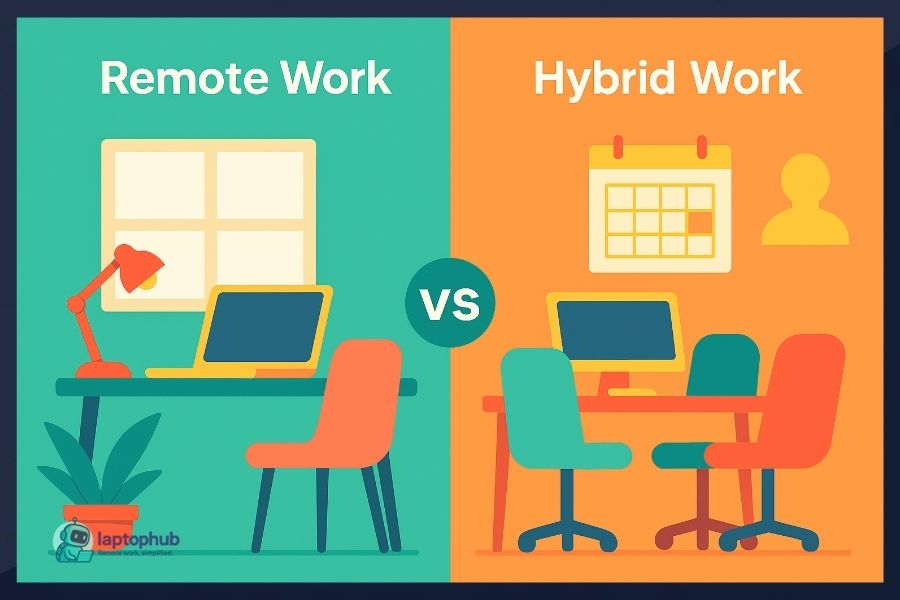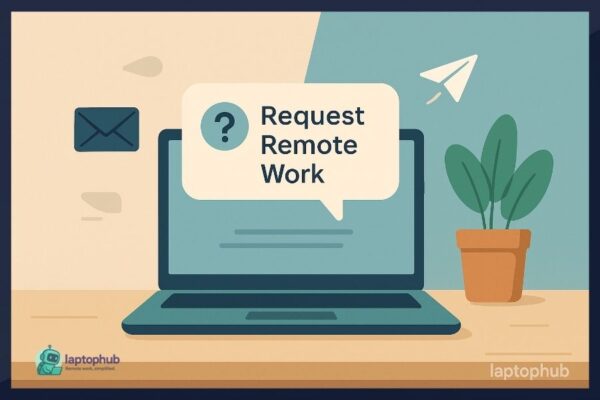The way we work has fundamentally changed. What used to be a choice between working in an office or not has expanded into a broader conversation: remote vs hybrid work. Companies are redefining policies, and workers are reevaluating what productivity, work-life balance, and job satisfaction really mean in a post-pandemic world.
But what’s actually better—remote or hybrid work?
The answer isn’t one-size-fits-all. It depends on your role, goals, and personality. In this article, we break down the pros and cons of each model, explore industry trends, address common concerns, and offer a practical guide to help you decide which setup fits your lifestyle and career ambitions.
💡Key takeaways:
- Remote work offers maximum flexibility and independence but requires discipline and can lead to isolation.
- Hybrid work provides a balanced mix of structure and flexibility, combining collaboration with autonomy.
- The ideal work model depends on personal preferences, job role, industry, and long-term career goals.
- Success in either setup requires the right tools, clear boundaries, and alignment with company culture.
What Is Remote Work?
Remote work means doing your job entirely outside a traditional office setting. This could be from home, a coworking space, a coffee shop, or even while traveling.
✅Pros of Remote Work:
- No commute: Saves hours each week, cuts transportation costs, and reduces stress.
- More flexibility: You can often structure your day around when you work best.
- Fewer distractions: No office chatter or unnecessary meetings (assuming your team is aligned).
- Broader job market: You’re not limited by geography. Work for a company across the country or even abroad.
❌Cons of Remote Work:
- Isolation: Social interaction drops off, which can impact morale and mental health.
- Work-life blur: It can be tough to disconnect when your workspace is also your living space.
- Communication gaps: Without intentional collaboration, it’s easy to get out of sync.
- Self-discipline required: No one’s watching you, so time management is critical.
What Is Hybrid Work?
Hybrid work is a mix of in-office and remote work. Employees might be in the office a few days a week and remote the rest. Some companies offer fixed days; others allow more flexibility.
✅Pros of Hybrid Work:
- Social interaction: You stay connected with colleagues, which helps with team bonding and culture.
- Structured flexibility: Balances autonomy with accountability.
- Access to office resources: Meeting rooms, better tech, ergonomic equipment, and on-site support.
- Better boundaries: Office days help separate work from home life.
❌Cons of Hybrid Work:
- Commute still exists: Even a part-time commute can add stress and cost.
- Coordination challenges: Not everyone will be in the office on the same days.
- Inequality risk: Those who come in more often may get more visibility.
- Logistical confusion: Shifting schedules, unclear policies, and poor implementation can hurt productivity.
Industry Trends: Who’s Doing What?
Not all industries treat remote and hybrid work the same. Here’s a quick breakdown:
- Tech & SaaS: Leaning remote-first, with flexible hybrid options.
- Finance & Law: Returning to office-heavy models, but many are adopting hybrid.
- Marketing & Creative Fields: Remote and hybrid thrive due to digital tools and independent workflows.
- Healthcare & Manufacturing: Remote is limited to administrative roles; hybrid is rare.
If you’re entering or switching industries, factor this into your decision-making.
Remote vs Hybrid: Which Is More Productive?
Productivity is personal, but certain trends are clear.
Remote work often boosts productivity in roles that need deep focus—like writing, coding, design, or research. Without commutes or office noise, many workers get more done in less time.
Hybrid work benefits team-based roles where real-time collaboration and spontaneous brainstorming matter. Quick in-person meetings can prevent long email threads and Slack fatigue.
A 2023 Gallup study found that hybrid workers reported slightly higher engagement than fully remote workers. But both groups outperformed traditional office-only employees in productivity, job satisfaction, and retention.
Which Is Better for Work-Life Balance?
Remote work gives you more control over your time. Want to work early and finish before 4 PM? It’s possible. Need to take a midday break to pick up kids or recharge? You have the flexibility.
But without boundaries, work can bleed into evenings and weekends. Burnout becomes a risk if you’re always “on.”
Hybrid work, with scheduled office days, can act as a natural barrier. The physical separation between home and office helps many people mentally “clock out” when the day is done.
Career Growth and Visibility
One of the biggest concerns with remote work is visibility. Will leadership remember you when promotions come up if they don’t see you around the office?
In some companies, unfortunately, proximity bias still exists. Hybrid workers might get more informal facetime, mentorship, and spontaneous opportunities. But forward-thinking, remote-first companies are addressing this with transparent performance metrics and regular virtual check-ins.
To grow your career remotely, you’ll need to:
- Be proactive about communication.
- Document your wins and share them.
- Network intentionally, even if it’s virtual.
- Find a mentor who understands the remote landscape.
Tech, Tools, and Setup
Whether remote or hybrid, your success depends on having the right tools.
For remote workers, invest in:
- A quiet, ergonomic workspace
- High-speed internet
- Video conferencing tools (Zoom, Google Meet)
- Project management platforms (Asana, Trello, Notion)
For hybrid workers, you’ll need to adapt quickly between home and office. Make sure:
- Files sync across devices (cloud-based systems)
- You can take meetings from anywhere
- Your schedule is visible to teammates
🖥️Also read: Best Remote Work Tools 2025: What Smart Teams Are Using Now
What Kind of Worker Are You?
To figure out which setup suits you, ask yourself:
- Do I thrive in solitude or need social interaction to stay energized?
- Can I manage my time effectively without supervision?
- Do I have a dedicated, distraction-free workspace at home?
- How important is facetime with leadership or peers for my role?
- Do I value autonomy over structure, or vice versa?
- How tech-savvy am I with remote collaboration tools?
Remote vs Hybrid Work FAQs
Is remote work more productive than hybrid work?
A: It depends on the role and personality—remote is better for deep, focused work, while hybrid supports collaboration.
What industries are best for remote work?
A: Tech, marketing, and creative fields tend to offer more remote flexibility, while healthcare and finance lean hybrid or in-office.
Can I grow my career while working remotely?
A: Yes, but it requires intentional communication, documentation of your achievements, and strong digital presence.
What’s the biggest downside of hybrid work?
A: Coordination issues and unequal visibility among team members can be challenging in a poorly structured hybrid setup.
How do I choose between remote and hybrid work?
A: Consider your need for flexibility, social interaction, productivity habits, and career growth preferences.
Final Verdict: Which One’s Best?
There’s no universal winner. The best choice depends on your personality, goals, and the nature of your work.
Choose remote if:
- You want maximum flexibility and autonomy.
- You have a strong home setup and can stay productive.
- Your role is independent and output-focused.
Choose hybrid if:
- You like a balance of social interaction and quiet focus.
- You value structure but still want some flexibility.
- Your work depends on frequent collaboration.
Whatever model you choose, make sure your company supports it with clear policies, the right tools, and a culture that values outcomes over optics.
Bottom line: Know your strengths. Understand your needs. Choose the work style that sets you up to thrive—not just in your current role, but across your career.
And remember: the future of work is flexible. Choose what works for you now, and be open to evolving as your needs (and the world) change.





